
Every year, Bangladesh unites in a vibrant display of reverence and cultural pride to honor the legacy of its National Poet, Kazi Nazrul Islam. Known as the Rebel Bard for his fierce poetic defiance against oppression and inequality, Nazrul remains an enduring symbol of resilience, secularism, and artistic freedom. This year’s Nazrul Jayanti 2025 saw an even grander celebration across the country, commemorating the 126th birth anniversary of this literary legend.
Kazi Nazrul Islam's contribution to Bengali literature and music transcends generations. From his revolutionary poems like Bidrohi to his soulful songs of love and devotion, his work speaks to the human spirit’s quest for dignity and justice. Nazrul's writings boldly challenged British colonial rule and religious extremism, earning him the title of “Bidrohi Kobi” or “Rebel Poet.”
Cities and towns across Bangladesh marked the occasion with a week-long series of programs. Dhaka hosted the largest celebration, with the Nazrul Institute organizing public recitations, lectures, musical renditions of Nazrul Geeti, and exhibitions of rare manuscripts. Educational institutions from primary schools to universities held essay contests, art competitions, and cultural performances to keep Nazrul’s teachings alive among younger generations.
In Nazrul’s birthplace, Churulia in West Bengal and Trishal in Mymensingh, people gathered for heartfelt tributes, showcasing the unity of shared cultural heritage that transcends borders.
Nazrul’s songs, or Nazrul Geeti, remain a cornerstone of Bengali music, blending classical ragas with patriotic fervor and spiritual themes. Musical events across the country revisited his iconic compositions, from devotional songs to protest anthems. Radio and television channels curated special programs, documentaries, and interviews with Nazrul scholars to deepen public understanding of his multifaceted genius.
In an age of rising polarization, Nazrul’s secular and humanist ideals resonate more strongly than ever. His message of unity between communities and his unwavering support for the marginalized remind us of the enduring need for voices that challenge injustice. From feminist writings to advocating worker rights, Nazrul’s body of work continues to inspire poets, musicians, and activists across the subcontinent.
The nationwide tribute to Kazi Nazrul Islam is more than a ceremonial tradition—it is a reaffirmation of the values that define Bangladesh’s cultural and spiritual identity. As we celebrate the Rebel Bard’s life and legacy, we are reminded that art and literature are powerful tools for resistance, transformation, and hope.



-112x63.27.webp)




-132x74.57.webp)



Comments
There are no comments for this Article.